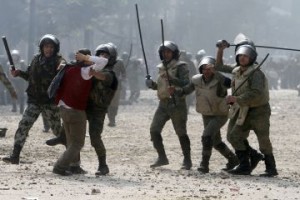Special to WorldTribune.com
CAIRO — The Muslim Brotherhood, fresh from its victory in
parliamentary elections, has been quietly reaching out to the military for a
transfer of power.
Egyptian opposition sources said the Brotherhood has been engaged in a
high-level dialogue with the military regime to ensure a transfer of power
sometime in 2012.

They said the talks were based on the assessment that the
Brotherhood would dominate parliament and sweep presidential elections,
expected to take place in June.
“Unfortunately, it looks like the group is seeking power at the expense of the revolution,” Bassan Qutb, a member of the Brotherhood’s Young Guard, said.
The sources said the talks included Brotherhood guarantees to grant privileges to Egypt’s powerful military. They said this would include immunity to military officers as well as the continuation of the military’s huge industrial base.
“We do not mind, so long as this facilitates the handover of power,” Brotherhood spokesman Mahmoud Ghazlan said.
In a Jan. 2 interview on Egypt’s Dream TV, Ghazlan said the Brotherhood was willing to grant the military immunity from all prosecution. He said this would include the use of live fire by soldiers against protesters in which more than 40 civilians were killed in December.
“We should talk about giving the military immunity,” said Ghazlan, who
suggested that the military apologize to the families of the victims.
The Brotherhood, expected to win at least 45 percent of seats, has been
declared the overwhelming winner in parliamentary elections. The Islamic
opposition as well as the Salafist parties, which follow Al Qaida doctrine,
could gain up to 70 percent of the seats in parliament.
At this point, the Brotherhood has renounced any intention to seek
defense or security ministries. Both the Brotherhood and the Salafists were
said to be prepared to limit themselves to social welfare and religious
portfolios in a government bereft of the secular opposition.
“We can only unite with parties that apply God’s Islamic Sharia law,”
Yasser Borhamy, a spiritual guide of the Salafist-oriented Nour Party, said,
“not with the liberals and democrats who follow Western norms and allow
freedoms without control.”
Egypt’s military, which receives $1.3 billion in annual U.S. aid, was
said to dominate the economy. The military, which often uses soldiers as
labor, controls hundreds of companies, including defense production, energy
and construction.
“There’s been a definite change in tone by the Brotherhood toward the
military that reflects extensive cooperation,” an opposition source said.
“That cooperation became a lot closer after the Brotherhood won
parliamentary elections.”
The Brotherhood was also said to have hampered an opposition demand for
a date for the handover of power by the military. On Jan. 11,
Egyptian political and reform groups were unable to agree on when the
military should end its control over the government.
“There was agreement on the document of freedoms and completing the
revolution,” Ahmed Maher, leader of the youth reform movement April 6, said.
“There was no agreement on the date for handing over power.”

You must be logged in to post a comment Login